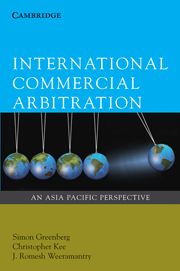Book contents
- Frontmatter
- Contents
- Foreword
- Preface
- Table of Cases
- Table of Statutes
- 1 Introduction to international arbitration and its place in the Asia-Pacific
- 2 Law governing the arbitration and role of the seat
- 3 Applicable substantive law
- 4 Arbitration agreement
- 5 Arbitral jurisdiction
- 6 The arbitral tribunal
- 7 Procedure and evidence
- 8 The award
- 9 The award
- 10 Investment treaty arbitration
- Appendix 1 Asia-Pacific arbitral institutions at a glance
- Appendix 2 Selected arbitral institutions
- Appendix 3 List of UNCITRAL Model Law countries
- Appendix 4 List of parties to the New York Convention 1958
- Appendix 5 Selected list of Asia-Pacific arbitration legislation and instruments
- Glossary
- Index
9 - The award
Challenge and enforcement
Published online by Cambridge University Press: 05 June 2012
- Frontmatter
- Contents
- Foreword
- Preface
- Table of Cases
- Table of Statutes
- 1 Introduction to international arbitration and its place in the Asia-Pacific
- 2 Law governing the arbitration and role of the seat
- 3 Applicable substantive law
- 4 Arbitration agreement
- 5 Arbitral jurisdiction
- 6 The arbitral tribunal
- 7 Procedure and evidence
- 8 The award
- 9 The award
- 10 Investment treaty arbitration
- Appendix 1 Asia-Pacific arbitral institutions at a glance
- Appendix 2 Selected arbitral institutions
- Appendix 3 List of UNCITRAL Model Law countries
- Appendix 4 List of parties to the New York Convention 1958
- Appendix 5 Selected list of Asia-Pacific arbitration legislation and instruments
- Glossary
- Index
Summary
Introduction
The two principal subjects dealt with in this chapter are the setting aside of arbitral awards and their enforcement. Once an arbitral tribunal has rendered its final award, the arbitral tribunal usually becomes functus officio. But this does not necessarily end the legal process between the parties in respect of that dispute. Post-arbitration litigation may follow. On the one hand, a party dissatisfied with the award may challenge it by attempting to set it aside in a domestic court. On the other, if the award is not honoured voluntarily, a successful party may require court assistance to enforce the award against an uncooperative losing party.
The challenge and enforcement of awards highlight the delicate balance between the autonomy of the arbitral process and the control of national courts. As Michael Riesman has observed in relation to the enforcement of awards:
Too much autonomy for the arbitrators creates a situation of moral hazard – and the theory of moral hazard holds that they are more likely to occur in the absence of controls – national courts will become increasingly reluctant to grant what amounts to preferred and fast-track enforcement of awards. But too much national judicial review will transfer real decision power from the arbitral tribunal, selected by the parties in order to be non-national and neutral, to a national court whose neutrality as between the parties may prove to be considerably less than that of an international arbitral tribunal.
- Type
- Chapter
- Information
- International Commercial ArbitrationAn Asia-Pacific Perspective, pp. 411 - 476Publisher: Cambridge University PressPrint publication year: 2010

